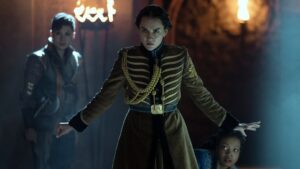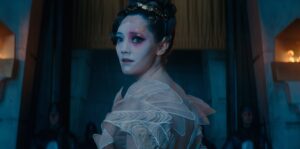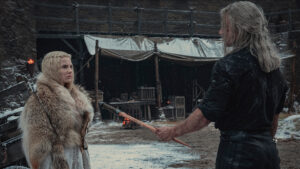SPOILERS FOR SHADOW AND BONE SEASON TWO AHEAD!
Netflix’s Shadow And Bone has never been a straightforward adaptation of the book series by the same name, which has proven to be both a blessing and a curse. A blessing, because Leigh Bardugo’s Shadow And Bone trilogy by itself is not particularly compelling source material and fans are generally in agreement that the author’s later books are significantly stronger due in large part to their more complex, multi-faceted characters, and a curse, because removing these characters from the context of Bardugo’s later books and creating a space for them amidst the events of her original trilogy, showrunner Eric Heisserer’s galaxy-brained solution to the problem he created for himself by refusing to adapt both stories separately, ultimately did a disservice to everybody in the first season. I am happy to report the second season has a “fix” for that too; less so to admit that – while it worked for me – it has only further enraged book purists, and without their support the show may not get another chance at this.

Let me be more clear (and if the message in bold lettering at the top of the page wasn’t enough, let this be your final warning that spoilers will follow). There are a total of seven novels set in author Leigh Bardugo’s Grishaverse – comprising the Shadow And Bone trilogy, Six Of Crows duology, and King Of Scars duology, published and intended to be read in that order, though many fans will tell you they started with Six Of Crows, a great entry-point to the Grishaverse, and gradually worked their way backwards and forwards from there. Netflix’s Shadow And Bone only properly adapted the trilogy’s first book in season one, with the Six Of Crows duology’s characters having relatively inconsequential original storylines written for them – set prior to the events of the book in which they first appeared – so they could be present without upstaging Shadow And Bone‘s actual protagonists.
Understandably, fans were left wanting a little more from the Crows, and I think the writers took this to mean that adapting more of their story was essential in season two. One thing about Shadow And Bone‘s writers, they clearly take every criticism into consideration, which is admirable, but they have a tendency to…over-correct, in response to criticisms both great and small. One fairly innocuous example of this that stood out to me, just because I remember how viewers complained of being unable to keep track of characters’ movements throughout the first season, is that every other scene transition is now accompanied by a map. But entire subplots have, for better or worse, been discarded because they were poorly-received.
Don’t get me wrong, the first season’s surface-level depiction of anti-Asian racism as a relentless barrage of microaggressions was not something that needed to make a comeback, but Ravkan discrimination against the Shu played an unexpectedly significant role in shaping the show’s half-Ravkan, half-Shu, biracial heroine, Alina Starkov (Jessie Mei Li), and her barely-explored complex feelings towards her home-country made her a more interesting protagonist in my opinion. But with racism in the Grishaverse suddenly ended (along with homophobia!), Alina is no longer tormented by these feelings, which once stood in the way of her becoming Ravka’s Sun-Summoner while simultaneously giving her crucial insight into the plight of the oppressed Grisha – magic-users – and the Darkling (Ben Barnes).

Other characters in Bardugo’s Grishaverse are murderers and manipulators and former members of the fantasy Hitler Youth, but none are as divisive as the Darkling, the immortal Grisha tyrant responsible for creating the Shadow-Fold, a towering wall of darkness severing Ravka from its coastline and trapping it between hostile neighbors to the north and south. In both the books and the show, Alina falls in love with the Darkling because he’s the first person to see her as something more than a mapmaker, but only in the books do they continue to have genuine feelings for each other after it’s revealed that the Darkling planned to use Alina’s unique abilities to move the Shadow-Fold for his apparently nefarious purposes. Any hint of a real emotional connection between the two was scrubbed from the second season’s scripts, probably in response to accusations that Shadow And Bone romanticizes abusive relationships, but to the obvious detriment of the entire series. Alina’s refusal to even treat with the Darkling for eight whole episodes makes her satisfied expression after becoming a Shadow-Summoner in the final scene…confusing at best, while the Darkling comes across as a downright pitiable villain, practically groveling at Alina’s feet for attention he will never again receive and resorting to empty threats when she ignores him. Where once there was a mutual understanding that came with drawbacks and advantages for the both of them, now there is nothingness – nichevo’ya in Ravkan.
And yet, Shadow And Bone still places great emphasis on the singular nature of Alina’s very literal connection to the Darkling, a bonding in their bones (or rather, the bones of Morozova’s Stag now grafted onto their own) which allows the one to invade the other’s dreams, then their mind, the space behind their eyes, and at last even their physical location. The mechanics behind it are fairly simple, but the show takes its time explaining how the bond is supposed to work and how it can be weaponized, leading to some gripping sequences where the two characters train to do just that. Still, it’s weird that Shadow And Bone has time in its busy schedule to play around with the bond when nearly every other plot-beat in Alina’s story fails to register as she and her supporting characters speed-run through the events of Siege And Storm and Ruin And Rising.
Not for the first time, a big-budget fantasy show has cheated me out of a sea-monster battle I feel I was rightfully owed by reducing the epic confrontation with the fabled Sea-Whip to a mere five minutes of characters thrashing around in knee-high water, losing a fight to a monster the size of an iguana, and my disappointment is immeasurable, but I will begrudgingly acknowledge that the CGI budget was probably better spent elsewhere (not on Alina’s powers, though, that’s for sure). I can also, to a certain extent, understand why Siege And Storm was not adapted separately from its sequel, because the book badly wants to be a suspenseful political thriller when in actuality it’s just…slow-moving and bloated. But to try and adapt the chapters of intricate political intrigue, divorced from the context of the book, is a writing choice I can’t rationalize or forgive. Alina’s fake engagement to Prince Nikolai Lantsov (Patrick Gibson, miscast in a role that called for slightly more charisma than he could offer), the cause for Prince Vasily Lantsov (Edward Davis)’s consternation, is one particularly complex storyline the show has no need for, and is forced to heavily abridge anyway, yet insists on adapting as if it’s vital.

But it’s had to be crammed into the first half of the season, along with what was Siege And Storm‘s climactic battle (which took place at the Little Palace in the book, rather than the Spinning Wheel – perhaps Netflix couldn’t afford to shoot at the Festetics Palace in Hungary again, or it was unavailable, but the Budapest Stock Exchange Palace, a reused location from season one, instead stands in for the Spinning Wheel, which was actually where Nikolai escaped in the book after the Little Palace fell to the Darkling). Ruin And Rising, the trilogy’s final book, is briefly summarized in the last few episodes; Alina, instead of fleeing into the network of tunnels under Ravka and spending months in hiding, escapes with Baghra (Zoë Wanamaker), the Darkling’s mother, immediately after the attack on the Spinning-Wheel and chases after the third of Morozova’s Amplifiers until Baghra quite casually reveals that the Amplifier is Alina’s boyfriend, Malyen Oretsev (Archie Renaux), and that to harness his powers Alina will have to kill him, before she – Baghra, that is, not Alina – sacrifices herself to break the bond between Alina and the Darkling (the last remaining interesting aspect of their relationship). None of these developments are dragged out for the sake of angst, which I suppose I should be grateful for, but fast-forwarding through the story isn’t a great alternative.
Not ten minutes into the finale, the Shadow-Fold is no more, and both Mal and the Darkling are dead – for now, at least; a bumblebee landing on Zoya (Sujaya Dasgupta)’s shoulder while she stands by the Darkling’s body foreshadows the arrival of Sankta Lizabeta, a character from the King Of Scars duology who helps resurrect the Darkling – and everyone is standing around awkwardly in what used to be the Shadow-Fold, saying their goodbyes. Alina refuses to part with Mal forever, though, and forces his soul back into his body using hastily explained dark magic, with one tragic side-effect: he no longer feels anything for her. In the books, this doesn’t happen, and Alina and Mal get the happily-ever-after ending that Mal always dreamed of, where Alina loses her Grisha powers and they retire to a farm and raise lots of children.
Needless to say, many readers felt cheated by that conclusion to Alina’s character arc, so the show has done away with it completely (another correction, but one that I think almost everyone can get behind). Mal decides to become a privateer like Nikolai, traveling the high seas, while Alina becomes Queen of the Grisha, all while still “engaged” to Nikolai. I love that this is the route we’re going with, because I’ve always been a proponent of platonic “Malina”, but again, this is something the show needed to establish earlier, and it just never carved out the time to do so (and on a side-note, everyone’s “ships” are breaking down the middle as a result of this change: Alina is with Nikolai but now reminiscing about the Darkling; Nikolai seems genuinely infatuated with her, and still hasn’t even glanced in Zoya’s direction; Mal is single and apparently ready to mingle).
It’s abundantly clear that the writers’ interest lies with the Crows, on the other side of the Shadow-Fold. No surprise there. The morally ambiguous, eccentrically-dressed (and for the time being at least, predominantly queer) Crows have a certain panache that Shadow And Bone‘s archetypal protagonists lack. Even outside of Ketterdam (the Crows’ home-turf, a precarious stack of casinos, nightclubs, and brothels clamoring over each other for tourists’ money), or separated from their veritable rainbow of a rogues gallery, the Crows are not only the more eye-catching characters but by far the more three-dimensional and real. Some of that can be attributed to the actors and their obvious delight in the roles they were practically born to play – Freddy Carter and Amita Suman, standouts among the ensemble cast, deliver equally phenomenal performances as the criminal mastermind Kaz Brekker and assassin Inej Ghafa, doing Bardugo proud in every scene; those where they act the part of Crows, indecipherable and unfeeling, and those where surprisingly eloquent confessions slip from their lips unbidden in each other’s presence, before they shamefully begin bricking up the gaps in their armor. Even though Inej boldly pushes Kaz to open up in the final episode and he rather hesitantly admits that he wants her to stay in Ketterdam with him, Inej realizes then and there that they still have a long way to go before they’ll ever be comfortable expressing how they feel through physical gestures of affection, and that she doesn’t have all the time in the world – so she chooses to leave the Crows and search for her family, giving Kaz time to consider whether he’s willing to begin healing and become the person she needs him to be.

A less complicated love blossoms between Jesper Fahey (Kit Young) and Wylan Van Eck (Jack Wolfe), the Crows’ demolition man. In a change from the books that came as a shock to some, Jesper and Wylan are already…intimately acquainted in Shadow And Bone, which means they obviously don’t spend several episodes silently questioning whether the other is interested in them, and Jesper doesn’t ever deliver what is arguably his most iconic line, “Not just girls”, nor will there ever be a chance again. Instead, the conflict in their relationship comes from their inability to get on the same page about what they really want – they’re both looking for passion, but they have completely different definitions of the word. And this change actually worked for me, as did most of the changes to the Crows, because I can tell these changes were made by writers who really love the Crows and understand them, even if they don’t always have the time and means in what is still technically an adaptation of Shadow And Bone to prove it to cynical book purists.
The most controversial change, of course, is the decision to adapt large chunks of Crooked Kingdom – the second book in the Six Of Crows duology – prior to the events of Six Of Crows, and with Kaz’s arch-nemesis Pekka Rollins (Dean Lennox Kelly) taking the place of Jan Van Eck, a character we still haven’t seen in the show (which is fine by me, because that means it’s not too late to cast Richard E. Grant in that role). The raid on Van Eck’s lawyer’s office; the Crows dressing up as Komedie Brute characters to pull off one of their plans; the iconic scene in which Kaz usurps Per Haskell (Tim Plester) as head of the Dregs, and where he pretends to have buried Pekka’s son alive; Inej becoming a pirate…it’s all here. To do any of that again would be redundant. But Inej being kidnapped by Van Eck and fighting Dunyasha, Jesper’s father coming to Ketterdam, the smuggling of Grisha refugees onto the boats with help from Nikolai, the auction for Kuwei Yul-Bo and Kaz’s confrontation with the Council of Tides are all major sequences that have not yet been adapted, so it’s not like there’s nothing left. These scenes will just be very different when they happen onscreen.
I won’t say it’s not occasionally frustrating, because of course it is. I would have just as gladly accepted more original storylines for the Crows in place of a loose adaptation of Crooked Kingdom (and I enjoyed the one written to keep them occupied through the back-half of the season, during which they travel to Shu Han in search of a blade that can cut shadows to help Alina). But as a fan of the Crows, I look at what was done with their characters this season – and how they were set up for the future – and I can’t help but feel excited that the story could potentially veer off in so many different directions now. Because Pekka Rollins is already in Hellgate Prison by season’s end, he’s had the opportunity to befriend the sixth future member of the Crows, Matthias Helvar (Calahan Skogman), while the Fjerdan still hasn’t even had the chance to meet Kaz. Because Inej is off traveling the world with Mal now, she can join the Crows at a different point during the Ice-Court heist and Mal can fill the small but significant role that Nikolai plays in Crooked Kingdom. Because Wylan is already with Jesper, the truth about his identity, when it inevitably comes out, could drive a wedge between them. And of course, Alina still being involved in the story introduces even more variables.

Of course, it all depends on whether Shadow And Bone gets renewed for a third season, and at Netflix that is never a guarantee (another reason I think the writers snuck in so many great scenes from later books this season, because they knew better than to assume that Netflix would let the show run long enough to get to those scenes organically). I remain cautiously optimistic that it will be picked up, or rather that the story will continue under the title Six Of Crows. Whether Bardugo book purists will give the writers another chance after so many controversial changes to the source material is a different matter. For the answer to that question, we shall have to wait and see.
Series Rating: 8/10








